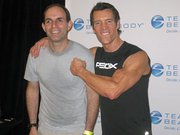 |
| Time’s running out! (photo: IMDB/20th Century Fox) |
Can any one of you by worrying add a single hour to your life? (Matthew 6:28)
I just watched the movie In Time (2011) (IMDB/Netflix). This is a sci-fi thriller. “In a near future where aging stops at 25, time is the new currency and the wealthy can live forever.” The characters have a time clock on one arm, genetically engineered to start counting down on their 25th birthday. (They are given a year at the start.) They do not physically age past that point, but their life spans are controlled by the amount of time they add to their personal clock. When the clock on your arm runs out, you die.
Financial (time) transactions are conducted from person to person through a special handshake, or using a handheld device. Time really is money in this society. The rich can enjoy life at a slower pace, but the poor have to rush around every day to make ends meet before their clocks run out. It is possible to accumulate large amounts of time, essentially allowing a person to live forever, or to lose it all in a moment, dying instantly.
There are several ways to view this movie. First, the obvious gap between rich and poor, who are literally separated by “time zones” with toll gates that require a lot of time “credit” to cross. Also, the idea that time has a tangible value. What would you do if every moment really counted? Of course we know it does on some level, but not as much as these people. That got me thinking about the relationship between the healthy and unhealthy choices we make every day, and how those affect the time we have left. In that sense, whether we have a timer on our arm or not, we really can have an effect on the length of our lives.
In the movie, the rich had an unimaginable number of years to spare, while some people lived day to day, or even hour to hour. How do the health choices we make every day affect the time we have left?
- Proper diet vs unhealthy food choices
- Excess weight (or in some cases, insufficient weight or body fat)
- Smoking
- Excessive alcohol consumption
- Illegal drug use
- Mental or physical stress
- Busy schedule
- Poor sleep habits (Guilty as charged!)
What steps are we taking to counteract or reverse the effects of these poor choices?
Sports nutritionist, personal training coach and triathlete Ben Greenfield writes about how in some ways even exercise can be bad for you. With this in mind, he researches and personally experiments with exercise recovery and life-extension techniques (including proper diet, supplements, and non-medical treatments). It’s possible to reduce and even reverse the effects of stress, fatigue, and other “time bandits” in our lives.
So are we supposed to look at every unhealthy diet or lifestyle choice as seconds, hours, or days off our lives? Well, I’ve heard people call a cigarette a “coffin nail,” which seems fairly accurate, but in general there’s no need to turn healthy lifestyle choices into another stressful aspect of our lives. (Stress is bad, remember?) Here’s the approach I am taking:
Make healthy choices most of the time. For me, it might be 80 percent or 90 percent of the time. It’s certainly not all the time, hopefully not 50 percent either. There’s always room for fine-tuning, experimentation, and trying something new to improve our health and fitness. For example, this week, try a vegetarian meal or two. Pick up a new exercise program, or add some variety to your workouts. Sleep a little longer, at least a few nights per week.
Reduce or eliminate time bandits. These are different for every person, but choose from the list above as a start. Do you smoke? I am begging you to stop. I’ve lost too many family members to the effects of long-term cigarette smoking. The sooner you quit, the better off you will be. The same goes for excessive alcohol use, or illegal drug use. That’s a little trickier to define, but ask your family and friends if you’re not sure.
I fought my own battle against weight gain and obesity, and I’ve been in weight maintenance mode for a couple of years now. Still, it’s a daily decision to eat right and maintain a reasonable calorie limit. Personally, I need to work on better sleep habits, and reducing my stress level. As I said, choose one of these areas for yourself, or pick something I might have left off the list, and make it your top health priority.
I’d love to know how this blog post has inspired you to make better choices to increase or take back your time. Please leave a comment below, or on my Facebook page.
Related Posts


